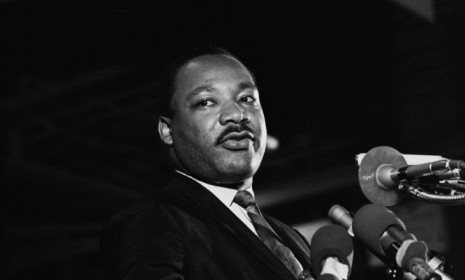The American dream is dying
Accept it. Do something.

A free daily email with the biggest news stories of the day – and the best features from TheWeek.com
You are now subscribed
Your newsletter sign-up was successful
Next year marks the 50th anniversary of Martin Luther King Jr.'s "I Have a Dream" speech, but it will hardly be a happy milestone. To put it bluntly, the American Dream is fleeting, and the country's prevailing mood is pessimism.
This new American pessimism is jarring. It feels sacrilegious. Americans are an inherently optimistic people. It took a certain faith in the unseen to settle an untamed land, survive the Great Depression, and push through the Civil Rights Movement. We see ourselves as resilient, and despite the last decade's economic chaos, remain a formidable force in the world. But an important new working paper commissioned by the Center for American Progress strings together a series of data sets that confirm some hard truths. Barely half of Americans are optimistic about economic growth. We don't trust government, particularly the feds. We don't even trust each other. And while we're increasingly pessimistic about the prospects of average folks, we're strangely not necessarily pessimistic about our own future. Those are the conclusions of Eric Uslaner, politics and government professor at the University of Maryland at College Park.
The fundamental culprit for these feelings is rising inequality. We all know that the very rich are getting wealthier, while much of what's left of the middle class is slipping into poverty. Last summer, Pew published a report concluding that barely 4 percent of Americans raised at the bottom of the economic ladder will rise to the top as adults. The "rags to riches" dream has become little more than a Hollywood myth. This is especially true for African Americans: Nearly two-thirds of blacks who grew up in families at the middle of the wealth ladder will fall to the lower rungs as adults. These trends are hard to ignore. It is timber for social unrest, and it is far from the vision of "common hopes and dreams" that, on election night, President Obama said was necessary to puncture the gridlock plaguing Washington.
The Week
Escape your echo chamber. Get the facts behind the news, plus analysis from multiple perspectives.

Sign up for The Week's Free Newsletters
From our morning news briefing to a weekly Good News Newsletter, get the best of The Week delivered directly to your inbox.
From our morning news briefing to a weekly Good News Newsletter, get the best of The Week delivered directly to your inbox.
Uslaner correctly observes that as Americans become more pessimistic, "they are less likely to believe that what happens to me affects you, especially if you are not just like me. The poor don't see a common destiny with the rich, whites don't see a linked fate with minorities, and we are less likely to trust people of different backgrounds." That partly explains much of Washington's tax debate. It also explains why we distrust our neighbors. We're digesting bite-sized news in silos exclusively for and about people like ourselves, and the institutions designed to explain what's happening to the country at large, or even whole cities, are faltering. We're killing the enablers of economic mobility: In Louisiana, the governor, Bobby Jindal, has pushed to cut spending on education and mental health care, just when we need schooling and therapy.
For much of the last year, I've thought and written about the state and future of the American middle class. When I tell people about this focus of study, the reaction is usually sharp. The sky isn't falling, one editor said, suggesting that I craft a more upbeat story focused on solutions. This response is understandable: American decline isn't a sexy topic. It conflicts with our national identity. We are often too close to the crisis to connect the dots on data and trends in a big-picture way, as Uslaner smartly does.
Clinging to optimism may be the easiest way to survive the crisis. But it ignores the hard truths. The first step to recovery is diagnosis, and acceptance of the crisis' severity. This isn't to suggest that we become fatalistic. But we should accept the facts — the American Dream is dying — and then move into some kind of substantive action.
Steven Gray is a journalist whose work has appeared in TIME, Fortune, The Wall Street Journal, and The Washington Post. Follow him on Twitter: @stevengray.
A free daily email with the biggest news stories of the day – and the best features from TheWeek.com
-
 How the FCC’s ‘equal time’ rule works
How the FCC’s ‘equal time’ rule worksIn the Spotlight The law is at the heart of the Colbert-CBS conflict
-
 What is the endgame in the DHS shutdown?
What is the endgame in the DHS shutdown?Today’s Big Question Democrats want to rein in ICE’s immigration crackdown
-
 ‘Poor time management isn’t just an inconvenience’
‘Poor time management isn’t just an inconvenience’Instant Opinion Opinion, comment and editorials of the day